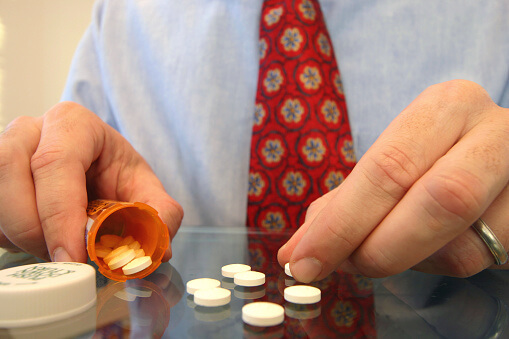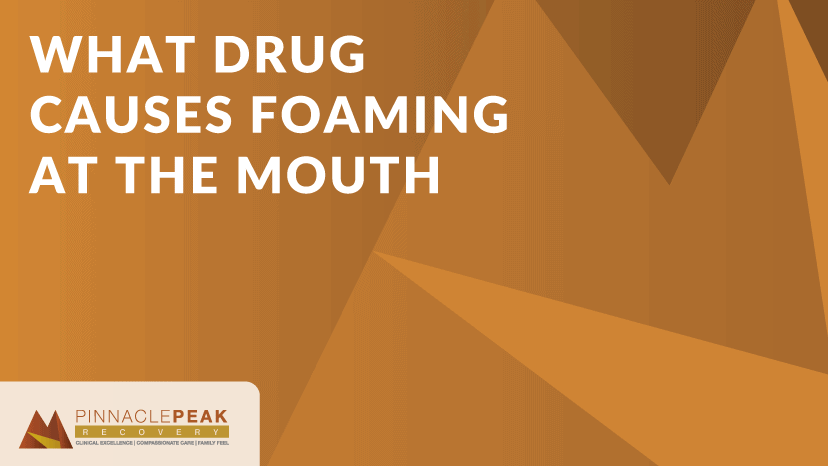The saying “foaming at the mouth” usually refers to having a high level of excitement for something that hasn’t happened or is just about to happen. The condition, however, isn’t just metaphorical. There are many different reasons why you might notice someone foaming at the mouth. Some of the common reasons behind foaming at the mouth include rabies, seizures, and even substance use. But what drug causes foaming at the mouth? Is there only one kind?

Substance use can make itself known in many ways, from changes in behavior to physical side effects as well. In Arizona, up to 40% of youth have tried at least one kind of substance in 2020. The most popular substance was alcohol, with e-cigarettes and marijuana being not far behind. Being able to recognize the signs of substance use can be beneficial for all ages, even the lesser-known side effects.
What Does it Mean if Someone’s Foaming at the Mouth?
Foaming at the mouth is not a condition on its own. The side effects that come in addition to foaming at the mouth will better indicate what might be occurring in someone.
Rabies
The odds of someone foaming at the mouth due to rabies is incredibly rare. In the past decade, only about 25 cases have been reported in the United States. If you notice them also displaying symptoms like weakness, fever, anxiety, agitation, confusion, or things like delirium or hallucinations, there’s a chance it could be rabies.
Seizures
Almost 3.5 million people, adults and children alike, have active epilepsy in the United States. Epilepsy isn’t the only source of someone having a seizure, either. Seizures can be a side effect of substance withdrawal as well for substances like alcohol or benzodiazepines.
If someone is experiencing a seizure, there are a few things you can do to help. Try to clear some space around them in order to make sure they don’t hurt themselves. Time the seizure. If it lasts longer than 5 minutes or they have multiple seizures in a short time frame with no recovery time in between, you should seek medical help. Place something flat under their head like a blanket.
Make sure you DON’T try to hold them down in any way. Also, don’t offer them any food or drink. Foaming at the mouth is not uncommon to occur during a seizure. Rest assured, this isn’t a sign of something worse and is just a normal side effect.
The best thing you can do after a seizure is to be calm and reassuring. They might be disoriented for a bit and having someone around who isn’t panicking can help them a lot.
Scared Your Loved One Might Overdose From Substance Use Disorder? Call Us Today!
Drug Overdose
Opioid overdoses can have symptoms such as foaming at the mouth. This is caused by a fluid leak in the lungs. If someone is experiencing an opioid overdose, there are other symptoms you should know about too.
Opioids are nervous system depressants, meaning they slow down the body’s responses and messaging system. Because of this, during an overdose, a person’s heart rate and breathing can slow, sometimes to dangerous levels.
If you notice a person exhibiting symptoms of an overdose, don’t be afraid to call for medical help. The Good Samaritan Law prevents you from getting into legal trouble when seeking medical assistance with an overdose.
Other Side Effects of Opiates
Not every opioid is an illicit substance. Many opioids are used to assist in pain management, especially post-injury. There are types of opioids, like heroin, that have only been created for illegal consumption.
Fentanyl is also an opioid, but a highly concentrated and synthetic one that has been on the rise in use. It’s a cheaper substance than most on the market, so many drug dealers will lace or cut their other substances with fentanyl to reduce costs while still creating a high. Unfortunately, due to its potent nature, this has led to an increase in overdoses. People will take their normal dosage, not realizing the potency will end up being much greater, and accidentally consume too much for their body to process.
Here are some common side effects that can develop from opioid use:
- Increased fatigue
- Decreased coordination
- Confusion
- Slurred speech
- Slowed breathing
- Slowed heart rate
There are other, social side effects that can occur with an opioid use disorder. When someone starts to withdraw from activities they used to love, if most of their day revolves around substance use, if they’re unable to lower or stop their substance use even when they want to, or if their relationships are starting to be impacted, it’s likely they have developed a substance use disorder.
It’s never too late to start a road to recovery if that’s the path you want to get back on.
Are There Treatment Options For Foaming at the Mouth?
Since foaming at the mouth is a symptom and not a set condition, the treatment options for it will differ depending on the source.
If a seizure lasts for longer than 5 minutes, or if someone has multiple seizures without time to recover between, it is cause for concern. As long as you help ensure they don’t choke or hurt themselves, by clearing the area around them and lightly cushioning their head, the foaming at the mouth will go away when a typical seizure is over.
For a substance use disorder, Pinnacle Peak is here to help. We can meet with you to determine what level of care will work best for you to get you back on the path you want to be on.
Substance Use Recovery Programs in Arizona
Recovering from any substance use can seem daunting at first, but this isn’t our first rodeo at Pinnacle Peak Recovery. We offer a full compendium of care, from detox to outpatient, and our compassionate and highly qualified staff are here to help you.
We believe in finding a recovery plan that works for you, not one that’s set in stone for everyone. Everyone who walks through our doors has a unique journey about how they got there, so why should their recovery journey be cookie-cutter? We offer 12-step programs as well as alternative, evidence-based treatment programs. We are fully committed to the lifelong success of everyone who steps into our facility. We want to see you reach your recovery goals.
If your or a loved one is looking to start the healing journey away from opioid use, we’re ready to assist you. Feel free to give us a call at 866-377-4761. We are happy to answer any questions you may have. We look forward to hearing from you.
Call Us Today!
Get Your Loved One The Help Their Need.
FAQs About What Drug Causes Foaming At The Mouth
What happens when you give Narcan to someone who doesn’t need it?
Narcan works to block opioid receptors within your body. If you give it to someone who doesn’t need it, it won’t affect them in a negative way.
What to do when someone is foaming at the mouth?
If they’re having a seizure, help clear the area around them, cushion their head, and time the seizure. Don’t hold them down. If someone is experiencing a substance overdose, call for medical help.


